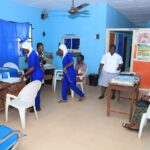For millions of Nigerians, home remains but a distant dream. Across the country’s urban areas, families live in cramped apartments within congested neighbourhoods, an all-too-familiar reality reflected in the country’s housing deficit currently estimated at 20 to 28 million units.
For years, this crisis was a result of broken policies, unaffordable loans, and a public housing system that effectively shut out average citizens. But, quietly, over the last two years, that narrative has begun to change.
Through the Federal Mortgage Bank of Nigeria (FMBN), long perceived as inefficient and inaccessible, a silent but powerful revolution began. What followed was more than a change in leadership or policy but a restructuring of hope itself.
At the heart of this transformation is the Renewed Hope Cities and Estates Programme, which launched with more than 3,000 housing units in Karsana, Abuja. With new management at FMBN, the bank began rolling out innovative mortgage products at unprecedented rates. Single-digit interest loans, previously unheard of in Nigeria’s financial space, were made available through the National Housing Fund (NHF).
Before long, a cross-section of Nigerians who had long seen home ownership as a luxury—civil servants, artisans, market women—were getting loan approvals. The Rent-to-Own scheme took it even further, allowing people to move into homes on a monthly basis without the burden of hefty down payments.
A mechanic in Kaduna, a nurse in Owerri, a schoolteacher in Ilorin—people from all walks of life began to take possession of keys they once thought belonged only to the wealthy.
But the transformation goes beyond bricks and mortar—it’s also about livelihoods. Each house built translates to multiple jobs created. Masons, electricians, painters, vendors of building materials all benefit. In areas like Lekki and Karsana, urban congestion is being addressed while local economies are stimulated. Over N46 billion has been pumped into these projects, supporting close to 85,000 jobs across the country.
Inclusivity has also become a defining feature of this revolution. New offerings like Diaspora mortgage and the non-interest NHF loan are expanding access to home ownership. Nigerians living abroad can now invest in property back home, staying connected to their roots while contributing to national development.
Meanwhile, those who prefer ethical, Sharia-compliant financing are no longer left behind. This recognition of diversity of both faith, income levels and professions is breathing new life into a sector long plagued by exclusion.
Even the process of engaging with the mortgage system is changing. The FMBN has embraced digital innovation, introducing a USSD code that allows contributors to check their NHF balances on the go.
People can now apply for loans online, monitor repayment progress, and get updates without visiting an office. In the background, the National mortgage registry is quietly being built as a central, digital platform that will one day allow banks, developers and homebuyers to verify transactions and titles with ease. It’s not just about comfort or convenience; it’s about trust, something the housing sector has long lacked.
To be clear, the challenges remain immense. Millions are still without homes, and the demand continues to outpace supply. Yet the signs of progress feel tangible. In Abuja, families are paying off their third rent-to-own installment. And for the first time, the Federal Mortgage Bank is reporting surpluses, not shortfalls.
These may seem like isolated victories, but collectively, they mark a national shift. Housing is no longer just a talking point—it’s becoming a solution, built brick by brick.
For many Nigerians, home ownership has been an elusive dream due to a wide housing deficit, often attributed to ineffective policies and unaffordable loans. However, recent changes spearheaded by the Federal Mortgage Bank of Nigeria (FMBN) have started to transform this narrative. The Renewed Hope Cities and Estates Programme initiated with the launch of over 3,000 housing units in Karsana, Abuja. FMBN introduced innovative mortgage products with single-digit interest rates, facilitating wider access to home ownership through schemes like Rent-to-Own, which allowed individuals to move into homes with manageable monthly payments.
The programme benefits a diverse range of citizens, including civil servants and artisans, while simultaneously creating jobs and stimulating local economies in areas like Lekki and Karsana. Inclusivity is further extended with Diaspora mortgages and non-interest NHF loans, allowing Nigerians abroad and those needing Sharia-compliant financing to invest in homes. The programme also embraces digital innovation, enabling contributors to manage accounts and applications online, building a foundation of trust within the long-troubled housing sector.
Though challenges remain with demand still outstripping supply, the positive developments are evident. The Federal Mortgage Bank is now reporting surpluses, signaling a significant change. These developments collectively mark a national shift, indicating that housing solutions are being constructed methodically, creating real change for many Nigerian families.






